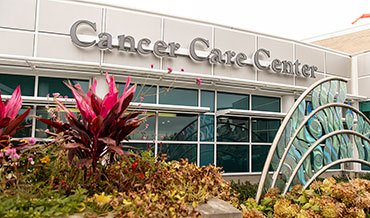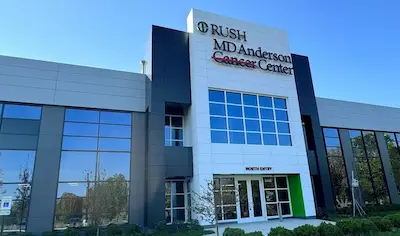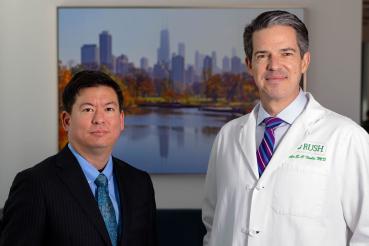Meningiomas are among the most common kinds of brain tumors — accounting for more than 30% of all brain tumors — and most are treatable. These slow-growing tumors are usually benign and can be removed surgically or treated with stereotactic radiosurgery.
But sometimes they are cancerous, or malignant. They can start to press on nerves and tissues in the brain. Benign meningiomas can also eventually grow large enough to affect other areas of the brain.
These tumors form in cells within the meninges, a protective layer of tissue that covers the brain and spinal cord. They are graded from I to III based on how quickly they grow, with about 80% of cases being Grade I, or benign and more easily treatable.

Symptoms of Meningioma Brain Tumor
The symptoms of meningiomas vary depending on how large they are, where they grow and how they affect surrounding tissue and nerves. Some meningiomas grow quite large before they start to cause symptoms at all.
The most common symptoms include the following:
- Headaches
- Weakness in an arm or leg
- Dizziness
- Nausea
- Seizures
- Sensory changes
- Changes in personality or behavior
- Impaired brain function
- Paralysis of parts of the body
Meningioma Diagnosis at Rush and RUSH MD Anderson
There are several tests a neurosurgeon can perform to diagnose meningiomas.
Many of these tumors are found “incidentally,” meaning they’re discovered by chance while running tests and scans for other issues, like trauma.
Some of the tests neurosurgeons might use to diagnose meningiomas include the following:
- Physical and neurological exam: A routine exam to help rule out other possible causes of symptoms
- Magnetic resonance imaging (MRI): A scan that uses a combination of large magnets and a computer to produce detailed images of organs and structures within the body
- Computed tomography (CT or CAT scan): A scan that uses a combination of X-rays and computer technology to produce cross-sectional images that show detailed views of the brain
- Pathological confirmation: A biopsy that involves taking a tissue sample of the tumor for further investigation, often at the time that the tumor is surgically removed
Meningioma Treatment at Rush and RUSH MD Anderson
If your doctor diagnoses you with a meningioma, they may use one or more of the following ways to treat your brain tumor:
- Monitoring: For noncancerous meningiomas that are not causing symptoms, your doctor may recommend a wait-and-see approach. If the tumor grows and starts to create problems, it may need to be surgically removed or treated with stereotactic radiosurgery.
- Skull base surgery: Skull base surgery is used to treat a meningioma or sinus and other skull base tumors, as well as other abnormalities near the bottom of the skull. It is performed by experienced, highly skilled skull base ENT surgeons and neurosurgeons.
- Radiosurgery: Our radiosurgery specialists treat hard-to-reach brain tumors with a nonsurgical, minimally invasive alternative to traditional brain surgery. It’s a robotic radiosurgery system called TrueBeam STx.
- Neurosurgery: Our neurosurgeons have many highly specialized techniques that allow them to target tumors without damaging surrounding tissue. Microsurgery, for example, involves using microscopes and precise tools to operate even in small blood vessels. Neuronavigation relies on computer-assisted technology and imaging to guide surgery within the skull and spinal column. And awake craniotomy can be used to monitor a patient’s speech, senses and other brain functions in real time to make sure critical structures are preserved.
Preparing for Your Meningioma Brain Tumor Appointment
When you have your first appointment with a neurologist, there are a few things you can do to prepare. Your care coordinator can provide instructions and help you gather anything you might need.
Some of the things you may want to bring to your appointment include the following:
- Any previous imaging scans or test results you have
- A list of any symptoms you're experiencing
- A list of all medications and supplements you’re currently taking
- Any questions you might want to ask your doctor
Second Opinions for Meningioma at Rush and RUSH MD Anderson
Our specialists offer second opinions for all brain tumors, including meningiomas, and treatment plans. A second opinion can help you confirm your diagnosis and give you confidence in any decisions you make about your health.
Nearly all cases are present at our physicians’ weekly brain tumor board, where experts from many fields work together and give input. They make sure each diagnosis is as accurate as possible and give their recommendations on the best care options for each patient.
You can learn more on our Getting a Second Opinion page.
Choosing Rush for Meningioma Treatment
- Experience that matters: Rush’s skull base and pituitary surgery team includes highly skilled experts from more than 10 medical specialties who work together to provide team-based, personalized care for meningioma and a full range of skull base brain tumors. Our program is among a handful that have in-depth experience with these rare tumors. In fact, only about 5% of U.S. hospitals evaluate and treat as many patients with pituitary and skull base tumors as we do. Because of our expertise, we can handle even the most complex cases.
- Nationally ranked experts focused on you: U.S. News & World Report ranked Rush University Medical Center among the best in the country for neurosurgery and neurology, ENT and cancer care.
- Leading-edge treatments and research: Here, you will have access to advanced treatments you might not find elsewhere as part of new clinical trial testing. For instance, our neuro-oncologists are studying targeted therapy according to tumor markers for people with meningiomas. Rush’s researchers have collectively published more than 300 articles on a wide range of topics related to pituitary and skull base tumor surgery, including quality of life after skull base surgery.
- Expertise in minimally invasive treatment: RUSH MD Anderson’s radiation oncologists treat hard-to-reach brain tumors with the nonsurgical, minimally invasive alternative to brain surgery, TrueBeam STx, a robotic radiosurgery system.
- Focused on quality of life for you and your family: The brain tumor team puts your quality of life and your family’s needs first. RUSH MD Anderson’s supportive oncology program offers many resources to help you and your family cope with the physical and emotional effects of a brain tumor. Social workers, therapists, nutritionists, integrative medicine specialists, chaplains and patient navigators are all available to support you through your treatment and beyond.
FAQs About Meningioma
The only way to know for sure if you need surgery for a meningioma is to get a diagnosis from a specialist. Meningiomas usually need treatment if they are growing quickly or causing symptoms. Many that grow slowly and do not cause symptoms can just be monitored over time.
Our specialists have many advanced techniques for treating meningiomas. These include robotic radiosurgery with TrueBeam STx, microsurgery using microscopes and precise tools to operate even in small blood vessels, neuronavigation with computer-assisted technology and imaging to guide surgery, and awake craniotomy to monitor a patient’s speech, senses and other brain functions in real time during surgery.
Some meningiomas that grow slowly and do not cause symptoms can just be observed over time. They will need to be monitored to make sure they don’t need to be removed with surgery in the future.
There are many factors that go into choosing the right treatment for a meningioma. The size and location of the tumor, how quickly it is growing and whether it is causing symptoms are all important to consider when coming up with a treatment plan. Your age, overall health and brain function are also factors that your specialist will consider.








